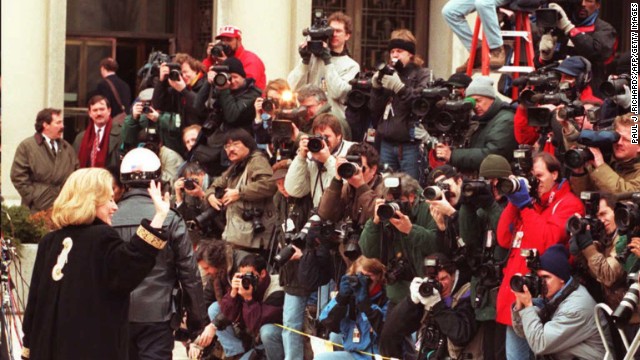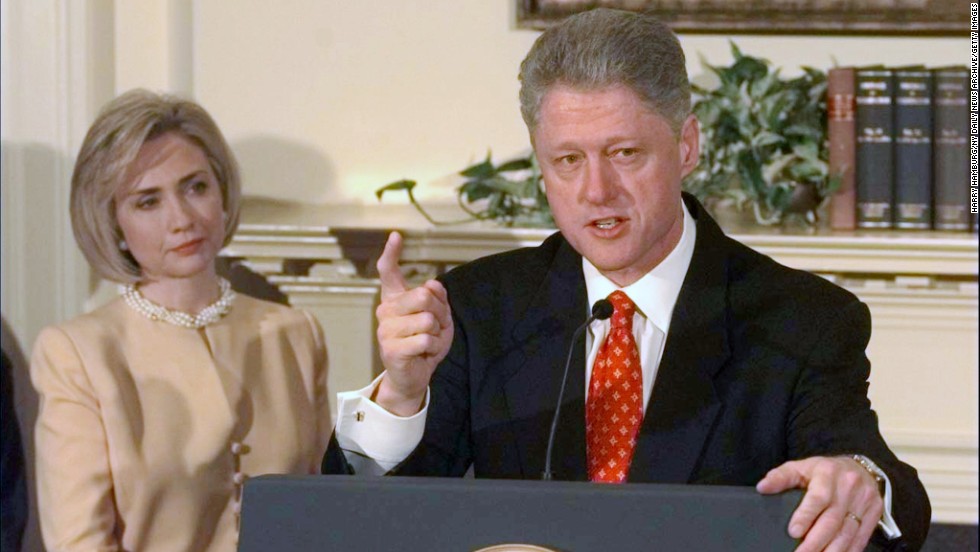New York (CNN)In her most extensive comments about Wall Street since launching her second presidential campaign, Hillary Clinton this week called for reining in big banks and ensuring that financial regulations don't get watered down.
But soon enough, Clinton will have to get a lot more specific than that.
The former New York senator is under close scrutiny from progressives, some of whom are skeptical of the populist tone Clinton has struck as a candidate so far. Wall Street reform advocates are eager to see Clinton, along with her fellow 2016 candidates, stake out policy positions aimed at curbing Wall Street's influence in Washington and over consumers.
The 2016 cycle is still young, and campaign officials have said Clinton will get to policy specifics in due time.
Here are five financial regulatory questions that Clinton will likely face as a candidate:
1. Should big banks be broken up?
It's a favorite rallying cry for Wall Street critics.
Reform advocates have proposed various ways to downsize the so-called "too big to fail" banks that they say were the main culprits behind the financial crisis.
Vermont Sen. Bernie Sanders, who is seeking the Democratic nomination for president and is viewed as a long-shot populist alternative to Clinton, introduced a bill in March that would require the Treasury Department to break up the country's largest banks including Bank of America, JPMorgan Chase and Goldman Sachs.
Other lawmakers have also proposed "TBTF" legislation in previous years.
In Iowa this week, Clinton didn't venture beyond saying that more needs to be done to "rein in" large banks.
2. Where are you on bringing back "Glass-Steagall?"
Here's an issue that's potentially awkward for Clinton.
There is a movement in Washington to bring back Glass-Steagall, a Depression-era law that separated commercial banking (read: boring) from investment banking activities (read: risky).
It's a tricky issue for Clinton to navigate because her husband Bill Clinton signed a law rolling back major provisions of Glass-Steagall in the 1990s, a period of sweeping financial deregulation.
Sens. Elizabeth Warren of Massachusetts and John McCain of Arizona introduced a bill during the last Congress to reinstate that law, making the case that financial institutions are better off sticking to traditional banking activities.
On the trail this week, Clinton spoke out against "risky behavior" on Wall Street.
3. Is the financial transaction tax a good proposal?
One idea for holding Wall Street banks more accountable? Tax them.
Reform advocates support putting in place additional taxes that would apply to certain financial transactions, particularly those that are widely viewed as holding more risk.
One Senate liberal who's proposed a financial transaction tax bill is -- you guessed it -- Sanders.
The Vermont senator's bill looks to eliminate undergraduate tuition at four-year public colleges with most of the funds coming from financial transaction taxes.
"The financial transaction tax is really a terrific way to change the incentives and shift them away from unproductive high speed trading, more towards investing in businesses that are growing and creating good jobs," said the AFL-CIO's Heather Slavkin-Corzo.
4. Who will you appoint to top finance and regulatory positions?
Last year, Antonio Weiss learned that working on Wall Street can cost you a job in Washington.
Obama nominated Weiss, at the time head of investment banking at Lazard, for a senior position at the Treasury Department. The pick drew a fury of backlash from big bank critics, including Warren, who feared Weiss was too close with the industry. Weiss ultimately withdrew his nomination and became a counselor to the Treasury secretary.
Wall Street reform advocates are determined to keep putting pressure on the administration to fill financial and regulatory positions with individuals who will defend the interests of the public ŌĆö not the big banks.
That scrutiny extends to presidential candidates like Clinton.
"A candidate could both support legislative change and tie commitments to that to how they're thinking about appointments," said Lisa Donner, executive director of Americans for Financial Reform. Donner added that it's also important what kind of economic advisers candidates surround themselves with.
5. Should there be tougher prosecution on Wall Street?
"Too big to jail" is another popular saying among Wall Street critics.
It's the perception that the Obama administration has been too reticent to put behind bars bank executives that engaged in reckless behavior in the run-up to the financial crisis, sticking with lesser punishments like civil penalties for institutions. Activists also complain that the Justice Department hasn't been aggressive enough in extracting guilty pleas.
The issue came under the spotlight once again this week when regulators announced that five major banks would pay $5.4 billion in penalties for trying to rig foreign currency markets.
The announcement irritated critics like Warren, who said it was one more demonstration of the administration letting bad actors off the hook. "Not a single trader is being held individually accountable, and regulators are stumbling over themselves to exempt the banks from the legally required consequences of their criminal behavior," Warren said.
Robert Weissman, president of the advocacy group Public Citizen, said Wall Street reform activists will push for "much more aggressive criminal prosecution of Wall Street wrongdoers."
"We need government prosecutors and government regulators to enforce the law," he said. "That's wholly within the power of the executive branch."

























































































